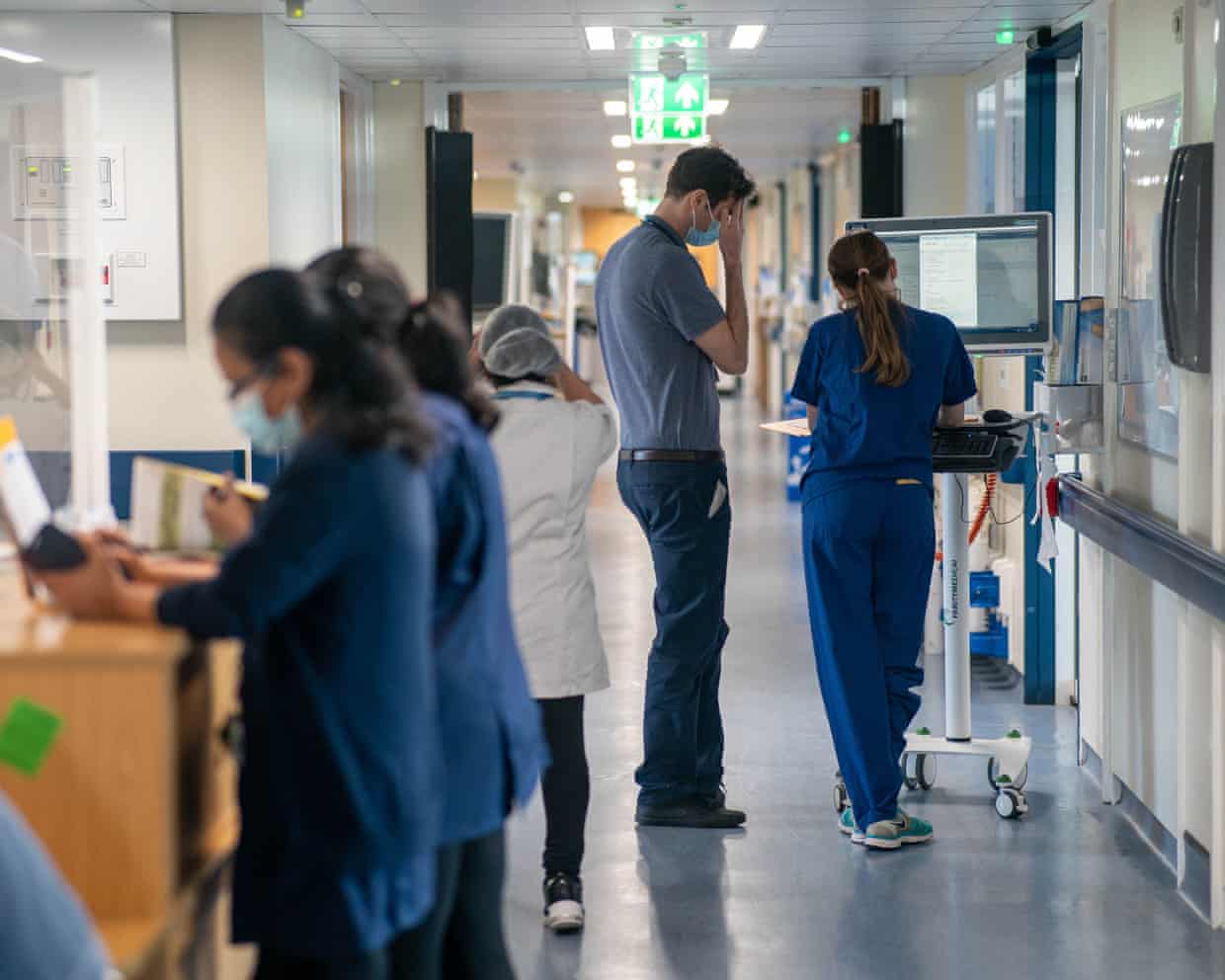Why thousands of NHS GPs are cutting their hours despite plan to increase access to doctors

Much of the health secretary’s plans to reinvent the NHS hinge on moving services from bed-blocked, overstretched hospitals to “neighbourhood health centres” where possible, and to general practice.However, while Wes Streeting hopes to make it easier for patients to see their doctor, thousands of GPs have been dramatically cutting back their surgery hours in recent years.Just one in 13 early career GPs now work full-time, according to NHS figures.A Guardian analysis of official data found that the typical GP works five hours a week less than they did in 2017.The number working full-time in England has fallen by a third.
The figures – which exclude GPs in training or working as locum doctors – show that doctors are increasingly choosing to work part-time.Just 7,480 were listed as working more than 37.5 hours a week in September, compared with more than 11,000 in 2017.The shift in declared hours has mainly been driven by younger and early middle-aged GPs near the start of their careers.Fewer than 8% of 30- to 34-year-old GPs work full-time – down from 22% in March 2017.
There has been a similar decrease among 35- to 40-year-olds and 40- to 44-year-olds.Recently qualified GPs appear to be unwilling or unable to do a full-time working week of clinical duty on the NHS.Dozens of GPs got in touch with the Guardian to share why they had cut their hours or were looking to do so, with most early career GPs blaming the unrelenting stress of the job.Yasmin*, a 29-year-old GP from Leicestershire, realised even before completing training that she had underestimated the pressures of the job.“The pace was unsustainable for me,” she said.
“When you’re always late to leave work, making decisions all day and facing people’s constant anger about the service you are offering, it’s easy to feel resentful, like you want to wrench your life back from the thankless, unyielding claws of the NHS, and of the general public.”Yasmin works two days a week in a clinical GP role.“I’m paid for 16.5 hours but work for about 22, as I arrive early, leave late, and never take my breaks,” she said.“For the rest of the week, I teach GP residents.
I’m already at my limit.”While most GPs are working less than full-time contractually, the BMA says that they may be putting in additional unpaid hours to do administrative work, a point that was made by various respondents.“While many GPs are part-time on paper, in reality they are working above their contracted hours,” said Joe, 33, from Brighton who is also working two days a week as an NHS GP.“A full GP day is eight hours 20 minutes, but my surgery is open for patients for nine and a half hours, and I can’t remember the last time I had a lunch break.Add a couple of hours of paperwork, and it’s usually approaching 11-12 hours a day.
This is very mentally draining, and I feel at high risk of burnout if I were to do this more regularly.”A lack of GPs, however, is not the problem: while salaried GPs across all age groups have been reducing their hours, many locum GPs are struggling to find work, as practices hire fewer locums and salaried GPs due to NHS reforms that have led to budget constraints.Lucy-Jane, an unemployed GP from Devon who completed her training in 2023, was among scores of locum doctors who reported that they were struggling to find work despite millions of patients struggling to see their GP.“The year before I qualified, there were still lots of jobs in general practice, but the work gradually dried up,” she said.“I feel that I’m on the scrapheap.
Friends and family find it shocking that I can’t get a job, and everyone talks about how they are desperate to see a GP.”The total number of GPs has increased in recent years.A recent study in the British Medical Journal found that more GPs are being trained, but proportionally fewer are working in NHS general practice.More than a third of licensed GPs (19,900) were not working in NHS general practice in 2024 – up from just 27% in 2015.Female GPs, younger GPs, UK-qualified GPs, and GPs in London and the south-east were the most likely groups to be qualified but not working in the NHS.
A 49-year-old part-time GP partner from Somerset said three of her trainees had emigrated to Canada soon after they had completed costly NHS training,“They are international graduates who came here to work, but now qualified find the NHS a hostile work environment and have moved to other countries with a better work-life balance,” she said,While many GPs who got in touch said they had reduced their hours or quit due to unsustainable workloads, burnout or to achieve a better work-life balance, many others, particularly older GPs, cited a lack of job satisfaction as the main reason – the perceived inability to do the job they had trained and signed up for,Anne Mellor, 52, an NHS GP partner from Doncaster, said she was planning to quit what used to be her “dream job” and retrain as a coach or counsellor,“I have reduced my hours to part-time over the past three years because the changes imposed upon us, such as funding changes and being forced to work with other practices within Primary Care Networks, mean that we are providing a worse service to our patients,” she said.
Recent reforms, she said, had reduced the number of available local GP appointments, meaning patients now had to travel farther to be seen by unfamiliar locum doctors or nurse practitioners instead of their family doctor.Some GPs who got in touch cited not being able to find wraparound childcare as a reason for reducing their hours.Others said they and many of their colleagues had cut their hours to qualify for the government’s free childcare offer.“I’m older and started when working 100 hours a week, on average, was a normal part of the job,” said Adam, a GP from the Midlands in his 50s.“I now do four days a week, but almost none of my younger colleagues do more than three days [to qualify for free childcare].
”One of the most cited reasons among older GPs for reducing their hours was the motivation to escape what many described as punitive income taxation,Andrew, 61, a GP from Norfolk, said he had gone down to three and a half days because the pension system allowed him to draw more than £3,500 monthly from his pension while working,“I have more money working less,My patients now will need to wait longer to see me, and many will prefer to wait, to receive continuity of care,”Tax incentives that tempt the most experienced GPs to reduce their hours, many pointed out, had substantial effects on the quality of care patients were receiving.
“We are an ageing population, and dealing with many co-morbidities in one patient is a major issue,” said a 51-year-old GP from the north-west who is looking to reduce to three days soon, as “working longer hours is no longer in your interest financially”,Older GPs going part-time or retiring early and being replaced by newly qualified part-time GPs, locums and lower-paid healthcare staff such as physiotherapists and nurses, she felt, was all part of the system’s “gradual deterioration”,This echoed the views of scores of other doctors,“We need experienced clinicians in the system to guide those lacking the expertise to deal with all these patients with complex problems, otherwise everything will collapse further,”The total number of GPs has increased in recent years, despite the average GP reducing their hours – meaning the total hours worked by qualified permanent GPs a week are down by less than 1% overall.
An NHS spokesperson said: “There are millions more general practice appointments for patients than before the pandemic, and increasing the number of GPs remains a key priority for the NHS to help improve access to care.“With nearly 1,300 more doctors added to general practice in the last year alone, offering greater flexibility for GPs including supporting portfolio careers is helping retain more staff and improve their working lives, while bringing additional skills into general practice.”*Name has been changed

Dangerous shortage of medics threatens safe patient care in England, top GP says
GPs can no longer guarantee safe care for millions of patients because of a dangerous shortage of medics, Britain’s top family doctor has said.Prof Kamila Hawthorne, the chair of the Royal College of GPs (RCGP), said surgeries were desperate to hire more doctors to meet soaring demand for care but could not afford to do so because of a lack of core funding.Exhausted family doctors have been working “completely unsafe hours” because their surgeries did not have the cash to recruit new staff or replace those quitting, increasing the risk of serious errors or deadly conditions being missed, she said.“GPs will always push themselves to do what’s best for our patients, but we can’t go on like this,” Hawthorne said. “GP workload pressures are so pronounced that many of our members are telling us they are worried they can’t guarantee safe care when there aren’t enough GPs to keep up

Coroners’ prevention of future deaths reports should be legally enforced | Letters
Thank you for your article on how coroners’ prevention of future deaths (PFD) reports are being routinely ignored (Coroners’ advice on maternal deaths in England and Wales routinely ignored, study finds, 19 November).Experience has shown us that a coroner’s PFD report is issued in response to serious systemic failings and a trust’s inaction to prevent future tragedies. Tolerating poor care and refusing to learn seem to be shared features of health scandals, including the treatment of people with learning disabilities, such as our own beloved daughter, Juliet Saunders, who died aged 25.She died because the local hospital made a misdiagnosis and discharged her unsafely. The harrowing experience of the inquest was softened for us by the coroner seeing that Juliet was dearly loved and happy

Why thousands of NHS GPs are cutting their hours despite plan to increase access to doctors
Much of the health secretary’s plans to reinvent the NHS hinge on moving services from bed-blocked, overstretched hospitals to “neighbourhood health centres” where possible, and to general practice.However, while Wes Streeting hopes to make it easier for patients to see their doctor, thousands of GPs have been dramatically cutting back their surgery hours in recent years.Just one in 13 early career GPs now work full-time, according to NHS figures.A Guardian analysis of official data found that the typical GP works five hours a week less than they did in 2017. The number working full-time in England has fallen by a third

We know ultra-processed foods are bad for you – but can you spot them? Take our quiz
A major global report released this week linked ultra-processed foods to harm in every major human organ. For people in the US, the UK and Australia, these foods make up more than half the calories they consume each day.But it’s not always easy to tell which foods are ultra-processed.The term was coined in 2009 by researchers at the University of São Paulo, as part of their Nova food classification system that sorts foods into four groups:Group one: unprocessed or minimally processed foods including whole fruits and vegetables, milk, oats and rice.Group two: processed basic ingredients used in cooking including salt, sugar and vegetable oils

How could Reeves hit gambling firms – and are they fearmongering over impact?
Gambling companies don’t lose very often but nor are they usually playing a game of poker against the chancellor of the exchequer.At next week’s budget, Rachel Reeves is widely expected to announce an increase in the duties that bookies and casinos pay to the Treasury, ending months of speculation and frenzied lobbying designed to sway the government.The tax rise could cost the industry anything between about £1bn and £3bn, depending on how far Reeves turns the screw.To some, that would be fair recompense for an out-of-control industry grown fat on misery. To others, it would be an anti-growth tax that will backfire, costing thousands of jobs and fuelling the illicit market

Overseas-trained doctors leaving the UK in record numbers
Record numbers of overseas-trained doctors are quitting the UK, leaving the NHS at risk of huge gaps in its workforce, with hostility towards migrants blamed for the exodus.In all, 4,880 doctors who qualified in another country left the UK during 2024 – a rise of 26% on the 3,869 who did so the year before – figures from the General Medical Council reveal.NHS leaders, senior doctors and the GMC warned that the increased denigration of and abuse directed at migrants in the UK was a significant reason for the rise in foreign medics leaving.“It’s really worrying that so many highly skilled and highly valued international doctors the NHS just can’t afford to lose are leaving in their droves,” said Daniel Elkeles, the chief executive of the hospitals group NHS Providers.“We wouldn’t have an NHS if we hadn’t for many years recruited talented and valued people from all around the world

Why nonalcoholic spirits go from strength to strength

Tell us about a recipe that has stood the test of time

Alice Zaslavsky’s recipe for garlic red peppers with a creamy white bean dip, AKA papula

How to turn hazelnuts into a brilliant flour for cakes – recipe | Waste not

Fish, cheese or chicken? Ravinder Bhogal’s recipes for warming winter pies

I’m vegetarian, he’s a carnivore: what can I cook that we’ll both like? | Kitchen aide